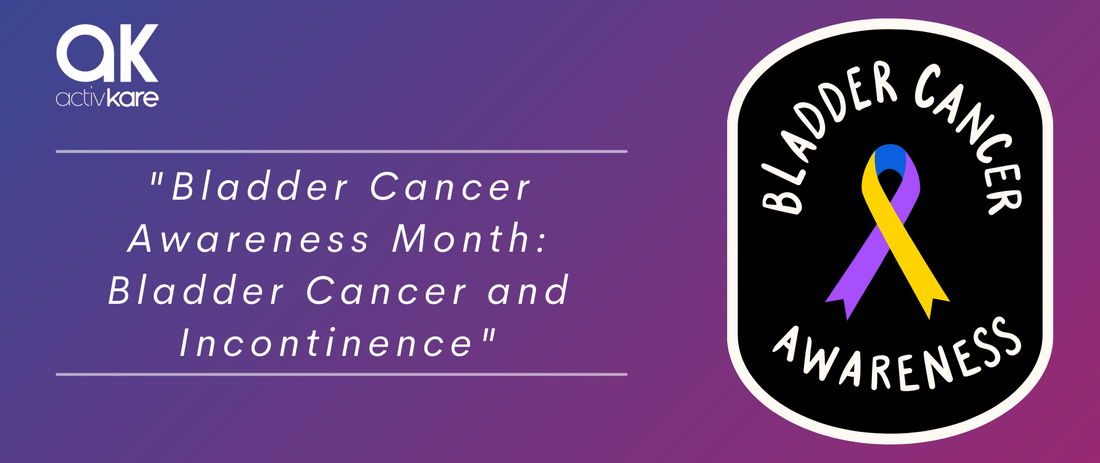It is Bladder Cancer Awareness Month, and at ActivKare we want to share some knowledge about how incontinence is a major side effect of bladder cancer and its related surgeries. Before we begin, let’s break down some information and statistics about Bladder Cancer.
What is Bladder Cancer?
Cancer occurs when cells in the bladder start to grow out of control. Bladder cancer most often begins in the urothelial cells that line the inside of your bladder. Most tumors develop on the inner layer of the bladder, and some can grow into deeper bladder layers. Bladder cancer can happen in the kidneys and ureters too, though this is much less common.
Statistics
- 1 in 5 Canadian seniors experiences some form of bladder control issues.
- An estimated 12,000 Canadians are diagnosed with bladder cancer each year.
- Bladder cancer is the 5th most common cancer in Canada, 4th most common among men and 11th most common among women.
Bladder Cancer and Incontinence, What is the Connection?
Urinary incontinence, which is the loss of bladder control and inability to control urination, can stem from many causes such as urinary tract infections, muscle weakness, stress, and nervous system disorders.
Concerning bladder cancer, incontinence can occur after one has received treatment. Treatments like radiation, chemotherapy and surgery for the bladder can irritate the urinary tract or damage the cells in the bladder and kidneys.
Types of treatments that can affect the bladder:
- Radiation therapy to the pelvic area can damage the cells and irritate the inner linings of the bladder.
- Some chemotherapy drugs can damage the nerves that control the bladder. Other types of chemotherapy treatments can lower hormone levels or cause vomiting.
- High-dose chemotherapy given before stem cell transplant can cause bladder inflammation and vomiting. Damage to nerves, altered hormone levels, bladder inflammation and vomiting can lead to loss of bladder control.
- Some hormone therapies can dry out the urethra, which can lead to loss of bladder control.
- Surgery to the pelvis can damage muscles or nerves connected to the bladder.
How to Manage Bladder or Urinary Incontinence
Depending on what’s causing it, urinary incontinence can be a short-term occurrence that can be solved with medication or other quick solutions provided by your doctor. But sometimes it can be a more serious and long-term struggle making it difficult to complete everyday activities.
More importantly, it is common for people who struggle with incontinence to feel a sense of shame or embarrassment which can take a toll on their mental health and delay getting the help they need. In our previous blog, “How Incontinence Affects Your Overall Mental Health” we focus on breaking the stigma to normalize talking about these struggles and help people find solutions so they can live a happier life.
If you are struggling to control your bladder, here are a few things you can do:
-
Pelvic floor muscle strengthening or kegel exercises with a professional Pelvic Floor Physiotherapist.
Doing exercises that tighten and relax the pelvic muscles can help you control the flow of urine. There are physical therapists and workout regimens specialized in these muscles that can assist you.
-
Bladder training
By assigning certain times to urinate throughout the day, you may train your mind and body to work together and control how frequently you urinate.
-
Medicines
Some medicines focus on the muscles of the bladder or the specific muscles that control urine flow. Consult with your doctor to see if this can be an option.
-
Surgery
This can be offered for more severe and long-term incontinence. There are a few alternative surgeries that may be an option depending on the cause of incontinence or previous medical history regarding it.
-
Incontinence products
The most manageable solution that does not require time, exercise or a doctor.
At ActivKare we provide a wide range of products for both men and women dedicated to making everyday life easier without stressing or worrying about incontinence.
Our products are tax-free and covered by private insurance, some disability insurance and Medicare to better help you live life freely to the fullest. Check out our products here.
----
The theme for bladder cancer awareness for 2022 is discussing the main barriers when diagnosing bladder cancer. The slogan for this year is: Don’t Go Red. Go To A Doctor. Further emphasizing the embarrassment people feel talking about these symptoms.
“It also has a double meaning on the use of the word “red”. Embarrassment is associated with blushing or turning red and with the main symptom of bladder cancer being the presence of blood, red, in the urine.” (World Bladder Cancer Patient Coalition)
The more we share our stories and normalize these conversations about urinary incontinence, the easier it will feel for those to get the help they deserve.
To learn more about how you can support Bladder Cancer Awareness Month, visit the World Bladder Cancer Patient Coalition website for resources.

